Related Research Articles

Miranda Jane Richardson is an English actress who has worked in film, television and theatre.
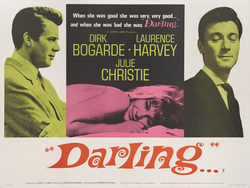
Darling is a 1965 British romantic drama film directed by John Schlesinger from a screenplay written by Frederic Raphael. It stars Julie Christie as Diana Scott, a young successful model and actress in Swinging London, toying with the affections of two older men, played by Dirk Bogarde and Laurence Harvey. The film was shot on location in London, Paris and Rome and at Shepperton Studios by cinematographer Kenneth Higgins, with a musical score composed by Sir John Dankworth.
The British Academy Film Awards, more commonly known as the BAFTA Awards, is an annual award show hosted by the British Academy of Film and Television Arts (BAFTA) to honour the best British and international contributions to film. The ceremonies were initially held at the flagship Odeon Cinema in Leicester Square in London, before being held at the Royal Opera House from 2007 to 2016. From 2017 to 2022, the ceremony was held at the Royal Albert Hall in London before moving to the Royal Festival Hall for the 2023 ceremony. The statue awarded to recipients depicts a theatrical mask.

Rachel Hannah Weisz is an English actress. Known for her roles in independent films and blockbusters, she has received several awards, including an Academy Award, a BAFTA Award, a Golden Globe Award, and a Laurence Olivier Award.

Adaptation is a 2002 American comedy drama film directed by Spike Jonze and written by Charlie Kaufman. It features an ensemble cast led by Nicolas Cage, Meryl Streep and Chris Cooper, with Cara Seymour, Brian Cox, Tilda Swinton, Ron Livingston and Maggie Gyllenhaal in supporting roles.
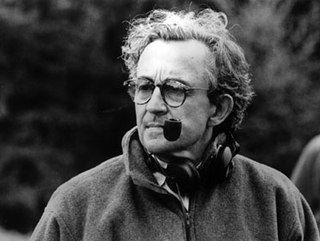
Louis Marie Malle was a French film director, screenwriter, and producer who worked in both French cinema and Hollywood. Described as "eclectic" and "a filmmaker difficult to pin down", Malle made documentaries, romances, period dramas, and thrillers. He often depicted provocative or controversial subject matter.
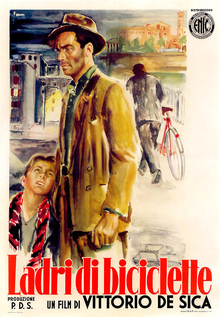
Bicycle Thieves, also known as The Bicycle Thief, is a 1948 Italian neorealist drama film directed by Vittorio De Sica. It follows the story of a poor father searching in post-World War II Rome for his stolen bicycle, without which he will lose the job which was to be the salvation of his young family.

Jean de Florette is a 1986 period drama film directed by Claude Berri. It was followed by Manon des sources, released the same year. Both are the adaptation of Marcel Pagnol’s 1963 two-part novel The Water of the Hills, with the second part also being adapted from Pagnol's original 1952 film Manon of The Spring. Berri's version was the first attempt at adapting the whole saga, including the first part, Jean de Florette, which was originally written as a prequel to the novelization of Manon of The Spring.

Topsy-Turvy is a 1999 British musical period drama film written and directed by Mike Leigh, starring Jim Broadbent as W. S. Gilbert and Allan Corduner as Sir Arthur Sullivan, along with Timothy Spall, Lesley Manville and Ron Cook. The story concerns the 15-month period in 1884 and 1885 leading up to the premiere of Gilbert and Sullivan's The Mikado. The film focuses on the creative conflict between playwright and composer, and their decision to continue their partnership, which led to their creation of several more Savoy operas.

Lionel Rodrigo de la Serna is an Argentine actor. He is known for playing Alberto Granado in the 2004 biopic The Motorcycle Diaries and Palermo in the Netflix series Money Heist.

John Ronald Simm is an English actor, director, and musician. He is best known for playing Sam Tyler in Life on Mars, the Master in Doctor Who, and DS Roy Grace in Grace. His other television credits include State of Play, The Lakes, Crime and Punishment, Exile, Prey, and Cracker. His film roles include Wonderland, Everyday, Boston Kickout, Human Traffic and 24 Hour Party People. He has twice been nominated for the BAFTA Award for Best Actor

A World Apart is a 1988 anti-apartheid drama film directed by Chris Menges, and starring Barbara Hershey, David Suchet, Jeroen Krabbé, Paul Freeman, Tim Roth and Jodhi May. Written by Shawn Slovo, it is based on the lives of Slovo's parents, Ruth First and Joe Slovo. The film was a co-production between companies from the UK and Zimbabwe, where it was filmed. It features Hans Zimmer's first non-collaborative film score. The movie was filmed on location in northeastern Zimbabwe.
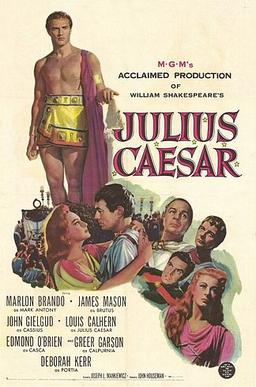
Julius Caesar is a 1953 American film adaptation of the Shakespearean play, directed by Joseph L. Mankiewicz and produced by John Houseman for Metro-Goldwyn-Mayer. It stars Marlon Brando as Mark Antony, James Mason as Brutus, Louis Calhern as Caesar, John Gielgud as Cassius, Edmond O'Brien as Casca, Greer Garson as Calpurnia, and Deborah Kerr as Portia.

The Magic Box is a 1951 British Technicolor biographical drama film directed by John Boulting. The film stars Robert Donat as William Friese-Greene, with numerous cameo appearances by performers such as Peter Ustinov and Laurence Olivier. It was produced by Ronald Neame and distributed by British Lion Film Corporation.

James McAvoy is a Scottish actor. He made his acting debut as a teen in The Near Room (1995) and appeared mostly on television until 2003, when his film career began. His notable television work includes the thriller State of Play (2003), the science fiction miniseries Frank Herbert's Children of Dune (2003), and the drama series Shameless (2004–2005).

Monica Margaret Dolan is an English actress. She won the BAFTA TV Award for Best Supporting Actress for playing Rosemary West in Appropriate Adult (2011).
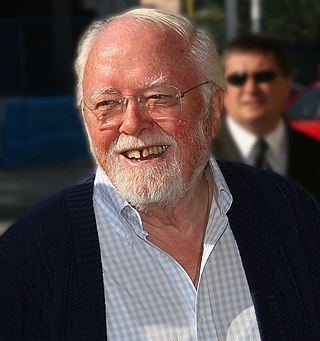
Richard Samuel Attenborough, Baron Attenborough was an English actor, film director, and producer.
Ric Esther Bienstock is a Canadian documentary filmmaker best known for her investigative documentaries. She was born in Montreal, Quebec and studied at Vanier College and McGill University. She has produced and directed an eclectic array of films from investigative social issue documentaries like Sex Slaves, an investigation into the trafficking of women from former Soviet Bloc Countries into the global sex trade and Ebola: Inside an Outbreak which took viewers to ground zero of the Ebola outbreak in Zaire - to lighter fare such as Penn & Teller’s Magic and Mystery Tour.
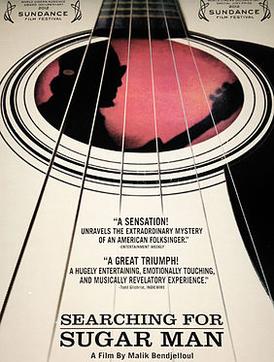
Searching for Sugar Man is a 2012 documentary film about a South African cultural phenomenon, written and directed by Malik Bendjelloul, which details the efforts in the late 1990s of two Cape Town fans, Stephen "Sugar" Segerman and Craig Bartholomew Strydom, to find out whether the rumoured death of American musician Sixto Rodriguez was true and, if not, to discover what had become of him. Rodriguez's music, which had never achieved success in his home country of the United States, had become very popular in South Africa, although little was known about him there.
The Boy Kumasenu is a 1952 feature film made in Ghana by a British film crew. It was produced and directed by Sean Graham from a script by Graham and John Wyllie. The score was by Elisabeth Lutyens. The movie became popular and had an impact on the social live of the people. It displayed signs of future potentials which made it become associated with anti colonialism and social change in the newly emerging independence Ghana.
References
- 1 2 3 Crowther, Bosley (6 February 1952). "Movie Review: The Pennywhistle Blues (1952)". The New York Times. Retrieved 21 March 2013.
- 1 2 3 "The Magic Garden (Review)". Jet: 61. 21 February 1952.
- ↑ "Film And British Film in 1952". BAFTA Website. Retrieved 21 March 2013.
- ↑ "BAFTA Awards: Awards for 1952". IMDb. Retrieved 21 March 2013.